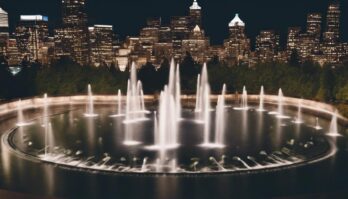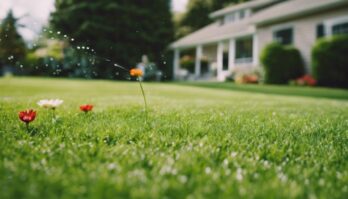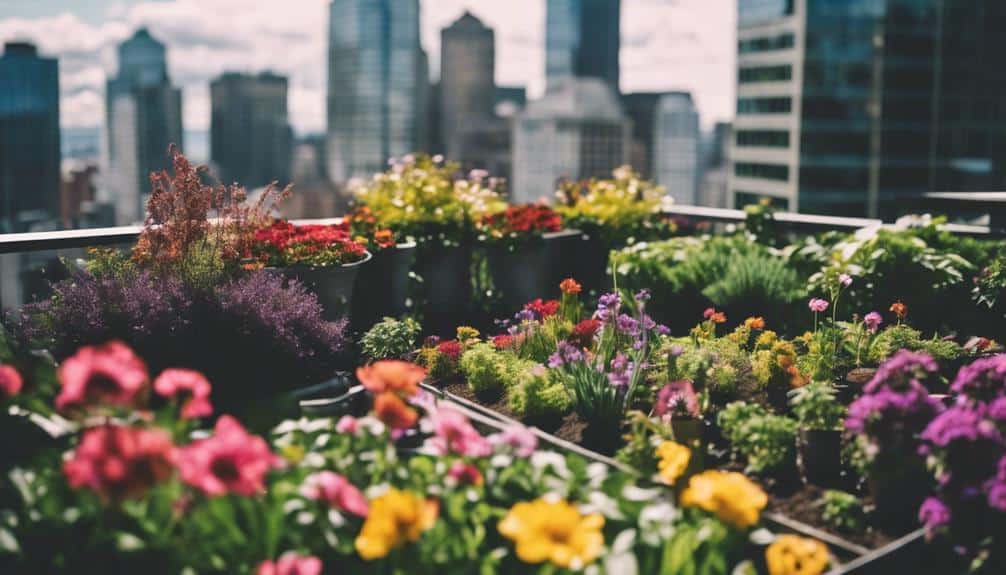
Imagine strolling through Seattle and stumbling upon vibrant pockets of greenery amidst the urban jungle. What if you could create your own lush oasis in the heart of the city? In this guide, discover the secrets to cultivating a thriving urban garden in Seattle. From selecting the perfect plants to navigating the city's unique climate challenges, you'll uncover valuable insights to kickstart your urban gardening journey. Get ready to transform your living space into a green haven that not only enhances your surroundings but also nourishes your soul.
Key Takeaways
- Choose resilient plants and native species for Seattle's climate.
- Implement vertical and container gardening in small urban spaces.
- Utilize water conservation techniques like drip irrigation and rain barrels.
- Engage in community gardening for health benefits and neighborhood bonds.
Benefits of Urban Gardening in Seattle
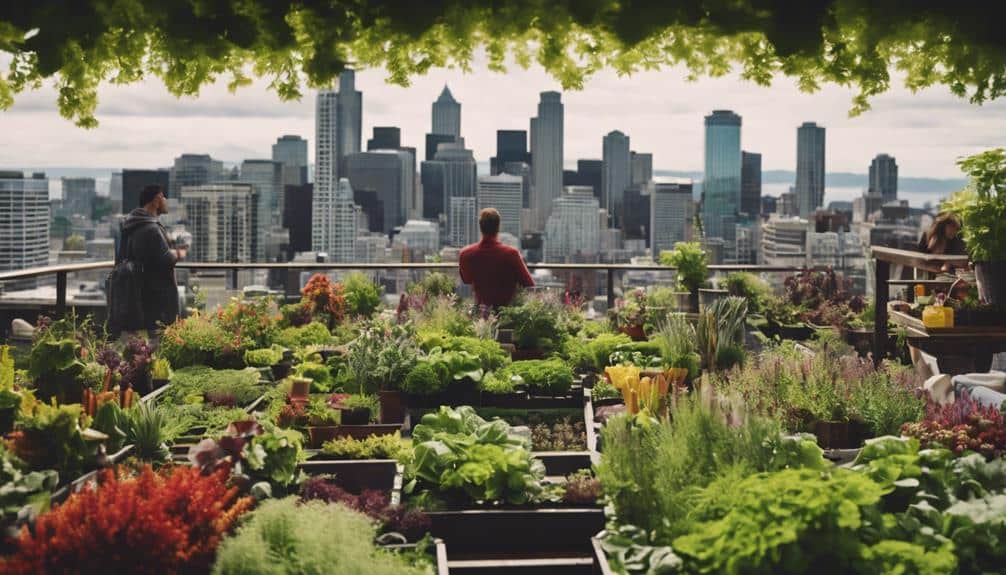
Urban gardening in Seattle offers a multitude of benefits that extend beyond just growing your own food. The health benefits are immense – from the physical activity involved in gardening to the fresh produce you will be consuming. Engaging in urban gardening also fosters community engagement. Sharing your gardening knowledge, surplus produce, or even just a friendly chat over your shared love for plants can create strong bonds with your neighbors. The sense of community that urban gardening brings is invaluable in today's fast-paced world. So, don't just see your garden as a plot of land; view it as a hub for promoting healthier lifestyles and building lasting connections within your community.
Essential Tools for City Gardening
When diving into city gardening, having the right tools at your disposal can significantly enhance your gardening experience and ensure your plants thrive in an urban environment. To keep your gardening tools organized in a limited space, consider utilizing storage solutions like vertical racks or hanging planters. Efficient organization tips such as labeling containers can save you time and effort when tending to your garden. When it comes to watering techniques, investing in an irrigation system can help maintain consistent moisture levels in your urban garden, especially during Seattle's dry summers. Drip irrigation systems or soaker hoses are excellent choices for urban gardeners looking to conserve water and ensure their plants receive adequate hydration.
Choosing the Right Plants for Seattle
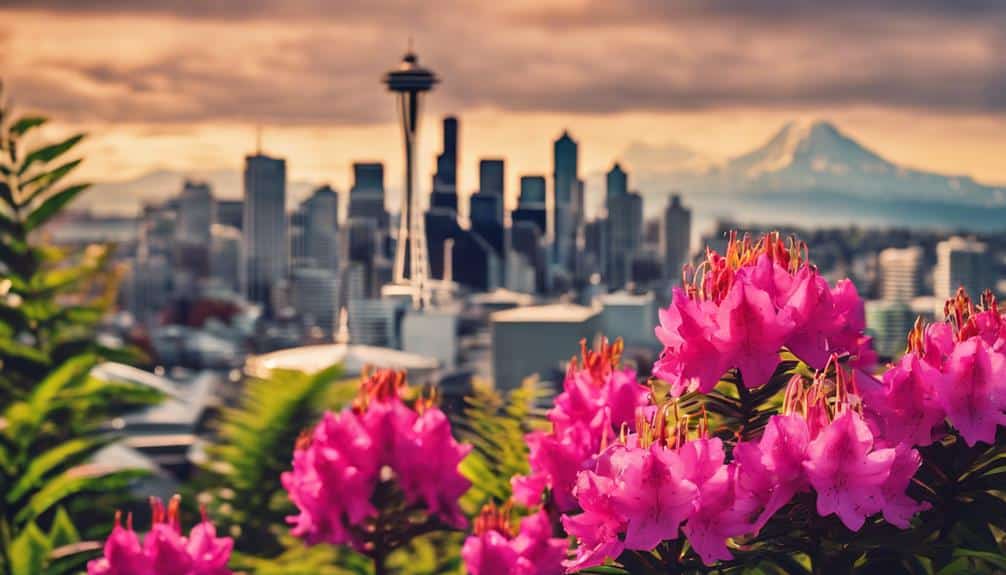
When cultivating your urban garden in Seattle, it's crucial to select plants that thrive in the region's unique climate. By choosing native species, you can take advantage of their natural resilience and adaptability. Consider factors like soil quality and sunlight exposure to ensure your plants flourish in the Emerald City.
Climate-Appropriate Plant Selection
Selecting the appropriate plants for Seattle's climate is crucial for thriving urban gardens in the area. When considering drought-resistant options and winter gardening techniques, you can create a robust garden that flourishes year-round. Here are some plant choices ideal for Seattle's climate:
- Lavender: Not only drought-resistant but also adds a lovely fragrance to your garden.
- Kale: Thrives in the cool, wet winters of Seattle and provides nutritious greens.
- Rhododendrons: Beautiful flowering shrubs that can handle the city's mild, wet winters.
- Blueberry Bushes: Perfect for Seattle's acidic soil and can withstand the winter chill.
Native Species Advantages
To cultivate a thriving urban garden in Seattle, harness the benefits of native species that are well-suited to the region's unique climate and conditions. Native plants not only thrive in Seattle's environment but also offer numerous advantages. By incorporating native species into your garden, you are creating wildlife habitats and promoting biodiversity. These plants have adapted to the local conditions over time, requiring less water once established, which aids in water conservation efforts. Consider using irrigation techniques like drip irrigation to further enhance water efficiency. Embracing native species in your urban garden not only adds beauty but also contributes to the overall health of the ecosystem around you.
| Native Species Advantages | Benefits |
|---|---|
| Wildlife Habitats | Promotes biodiversity and supports local fauna |
| Water Conservation | Requires less water, aiding in conservation efforts |
| Irrigation Techniques | Utilize drip irrigation for enhanced water efficiency |
Soil and Sunlight Considerations
Incorporating native species into your urban garden not only enhances its beauty and ecosystem health but also sets the foundation for choosing the right plants for Seattle based on soil and sunlight considerations. When selecting plants for your Seattle garden, consider the following:
- Soil Composition: Ensure the plants you choose are well-suited to Seattle's native soil types, such as the well-draining sandy loam commonly found in the area.
- Sun Exposure: Take note of the sunlight patterns in your garden to select plants that thrive in the specific light conditions, whether it's full sun, partial shade, or deep shade.
- Moisture Level: Factor in the rainfall patterns of Seattle when choosing plants that can withstand the city's wet winters and dry summers.
- Temperature Tolerance: Select plants that can adapt to Seattle's mild climate, which rarely sees extreme temperatures.
Maximizing Small Urban Spaces
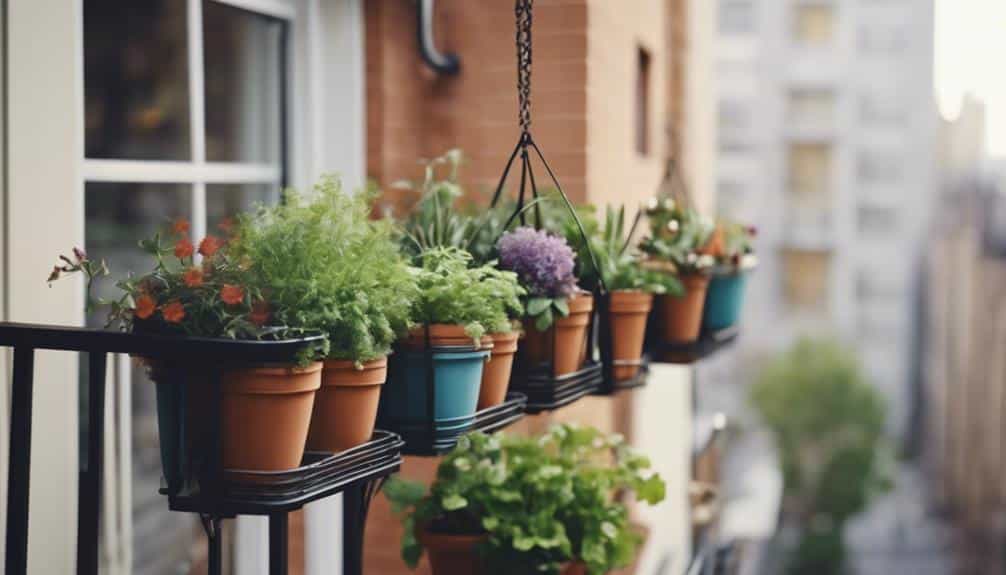
When aiming to make the most of limited urban spaces for gardening, creativity becomes your best friend. Embrace vertical gardening to utilize walls and fences, hanging planters, and trellises for climbing plants. Container gardening is another fantastic option, allowing you to grow herbs, vegetables, and flowers in small spaces like balconies or patios. Consider using stackable planters or repurposed containers to maximize your planting area. Hanging baskets can add a pop of color while saving ground space. Utilize every nook and cranny by thinking outside the box – even a sunny windowsill can become a mini herb garden. With vertical gardening and container gardening, you can transform any small urban space into a lush oasis.
Sustainable Practices for Urban Gardens
Embrace sustainable practices to nurture your urban garden and contribute to a greener, more environmentally friendly community. Here are some essential tips to help you achieve sustainability in your urban gardening efforts:
- Water Conservation: Install a drip irrigation system or use rain barrels to collect water for your garden, reducing water waste.
- Rooftop Gardens: Utilize your rooftop space for gardening to maximize greenery in urban areas and promote biodiversity.
- Companion Planting: Planting complementary crops together can help naturally repel pests and reduce the need for harmful pesticides.
- Organic Fertilizers: Opt for organic fertilizers to enrich your soil without introducing harmful chemicals to the environment.
Composting Tips for City Dwellers
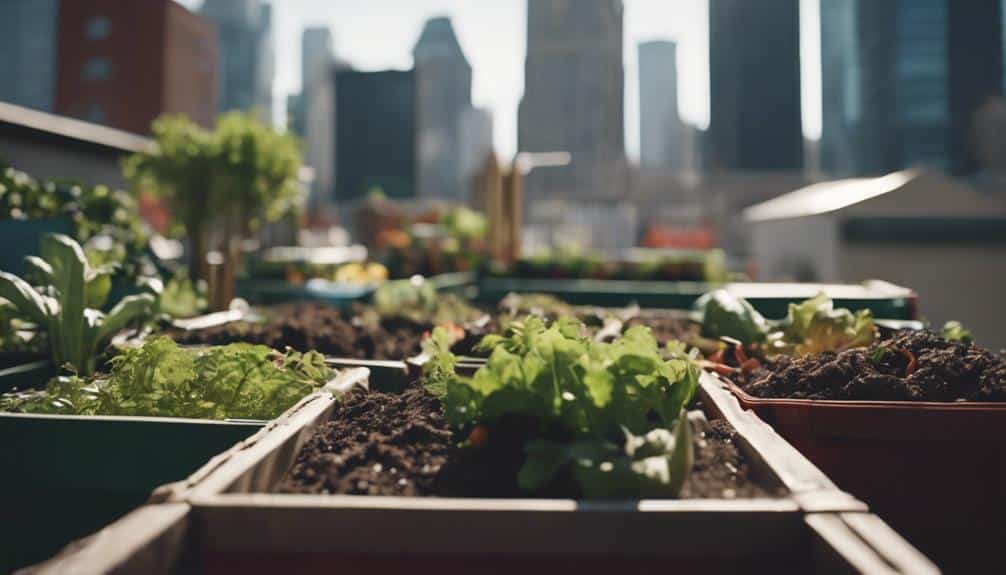
To enhance your urban gardening experience and reduce waste, mastering composting as a city dweller is key. In small spaces, indoor composting can be a game-changer. Utilize compost bins specifically designed for indoor use to turn your organic waste into nutrient-rich soil. Balcony gardening enthusiasts can benefit greatly from composting. Consider using a small compost tumbler or vermicomposting (composting with worms) to manage organic waste effectively in limited outdoor areas. Remember to balance your greens (food scraps, coffee grounds) with browns (dry leaves, shredded paper) to create the perfect compost mix. By composting, you not only reduce landfill waste but also nourish your plants naturally, fostering a more sustainable urban garden.
Dealing With Seattle's Climate Challenges
Navigating Seattle's unique climate challenges requires strategic planning and a deep understanding of the region's weather patterns. To thrive in your urban garden despite the extreme weather fluctuations, consider the following:
- Adapting Plants: Choose native plant species that are resilient to Seattle's climate, such as rhododendrons or ferns.
- Urban Garden Resilience: Implement raised beds or container gardening to protect your plants from excessive rain or drought.
- Water Conservation: Install a rain barrel to collect rainwater for irrigation during dry spells.
- Extreme Weather Preparedness: Have row covers or shade cloths on hand to shield plants from sudden temperature changes.
Community Gardening Opportunities in Seattle
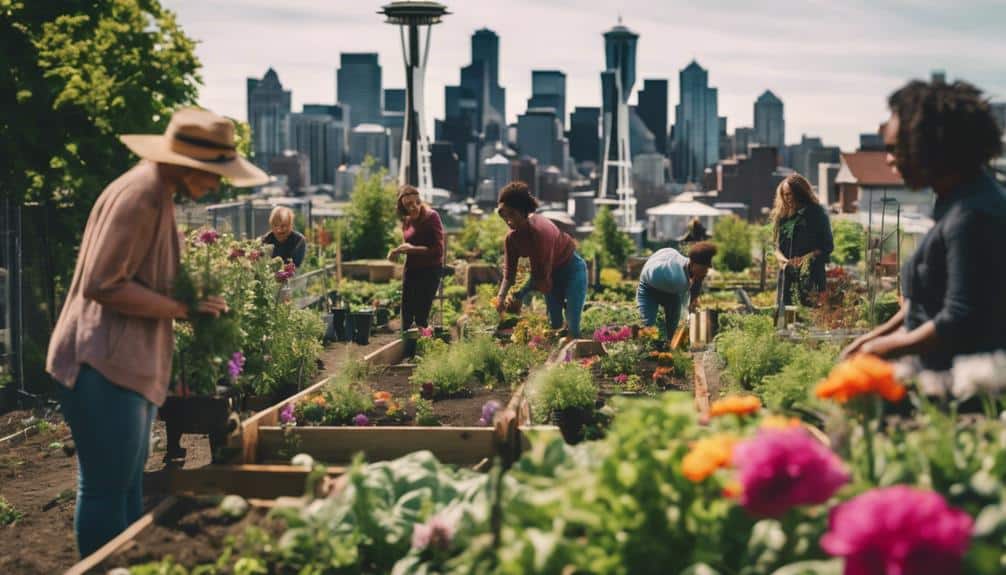
Discover the vibrant network of community gardening opportunities waiting to enrich your urban gardening experience in Seattle. Engage with your community while contributing to urban greening initiatives that promote food security and foster neighborhood connections. Seattle offers numerous community gardens where you can rent a plot or volunteer your time to cultivate shared spaces. Check out the table below for a selection of community gardens in different neighborhoods across the city:
| Community Garden | Location | Contact Info |
|---|---|---|
| Beacon Food Forest | Beacon Hill | [Website](https://beaconfoodforest.org/) |
| Danny Woo Garden | International District | [Email: info@dannywoogarden.org](mailto:info@dannywoogarden.org) |
| Picardo Farm P-Patch | Wedgwood | [Phone: 206-525-1213](tel:206-525-1213) |
| Alleycat Acres | Various locations | [Instagram](https://www.instagram.com/alleycat_acres/) |
| High Point Market Garden | West Seattle | [Facebook](https://www.facebook.com/HighPointMarketGarden/) |
Urban Garden Maintenance Tips
To keep your urban garden thriving, ensure you prioritize soil health basics like proper drainage and nutrient-rich soil amendments. Implement pest control strategies such as companion planting, natural predators, and organic repellents to protect your plants from unwanted visitors. By staying proactive and attentive to your garden's maintenance needs, you can enjoy a bountiful harvest and a flourishing urban oasis.
Soil Health Basics
Enhancing the vitality of your urban garden begins with understanding the fundamental principles of soil health. To ensure your plants thrive, consider these essential soil health basics:
- Soil Testing: Start by testing your soil to understand its pH levels and nutrient content.
- Nutrient Management: Based on the soil test results, adjust the nutrient levels by adding compost or organic fertilizers.
- Aeration: Regularly aerate the soil to improve water and nutrient penetration.
- Mulching: Mulch the soil surface to retain moisture, suppress weeds, and improve soil structure.
Pest Control Strategies
Unveil effective strategies to safeguard your urban garden from pests and ensure its flourishing growth by implementing targeted pest control measures. When it comes to pest control in urban gardening, utilizing organic solutions and adopting integrated pest management techniques can help maintain a healthy garden ecosystem without harmful chemicals. By incorporating beneficial insects, like ladybugs and lacewings, you can naturally control pest populations. Additionally, practicing crop rotation and companion planting can deter pests while promoting plant health. Check out the table below for a quick reference on organic pest control methods.
| Pest Control Method | Description |
|---|---|
| Beneficial Insects | Introduce ladybugs and lacewings to prey on pests |
| Crop Rotation | Plant different crops each season to deter pests |
| Companion Planting | Grow plants together that benefit each other |
Frequently Asked Questions
How Can I Involve My Children in Urban Gardening in Seattle?
Get your children involved in urban gardening in Seattle by planning child-friendly activities and garden-themed crafts. Explore educational opportunities together, fostering family bonding while nurturing plants and creating lasting memories in the city.
Are There Any Specific Regulations or Restrictions for Urban Gardening in Seattle?
In Seattle, there are specific regulations regarding urban gardening. Be aware of Seattle regulations on gardening restrictions to ensure compliance. Community involvement and family activities can flourish within the bounds of these rules.
Can I Keep Bees or Chickens in My Urban Garden in Seattle?
Yes, you can keep bees or chickens in your urban garden in Seattle. However, it's crucial to check city ordinances first. Urban livestock can be a rewarding addition, but understanding local regulations is essential for a successful setup.
How Can I Attract Pollinators to My Urban Garden in Seattle?
Want to create a buzzing paradise in your urban garden? Plant native flowers to attract bees. Embrace container gardening for butterflies. Be the pollinator pied piper of Seattle, luring in beneficial insects effortlessly.
Are There Any Local Resources or Organizations in Seattle That Support Urban Gardening Initiatives?
You'll find robust community partnerships in Seattle supporting urban gardening. Engage in fulfilling volunteer opportunities with local organizations dedicated to cultivating green spaces and promoting sustainable practices. Connect, learn, and grow together!

